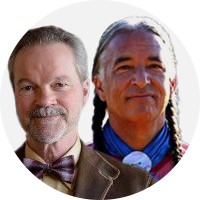The views expressed in our content reflect individual perspectives and do not represent the authoritative views of the Baha'i Faith.
In this continuing series of articles, Lakota Baha’i Kevin Locke and scholar and author Chris Buck continue their conversation about the Baha’i teachings and the Indigenous holy messengers.
Q: Yesterday, Kevin, during our phone conversation, you mentioned that the presence of Christian missions on Indigenous American and Canadian reservations has historically had a polarizing effect. Recently a Catholic Church was burned down in one location near where you live—and that Catholics were expelled from another reservation. Would you please elaborate, and explain why? The intent of this question is not to criticize any particular religion, but to discuss the impacts that religions historically have had on Indigenous populations.
A: Chris, it’s not the presence of Christian missions that has had a polarizing effect—it’s the overarching and driving assumption by the “colonizers” that nothing Indigenous has any validity or worth and, in fact, requires total extirpation and annihilation.
This assumption is inter-generational, carried forward by current descendants of Euro-American immigrants in their refusal to acknowledge or even allow the consciousness of the validity of anything Indigenous to this land. That perpetual immigrant expression of righteousness and entitlement wears thin on many Indigenous peoples.
It was the archdiocese in Rapid City that arbitrarily decided to burn down its own historic church in Wakpala, South Dakota, without any consultation with the local residents or the tribe. In another community I recently visited it was reported that there had been so much inter-generational abuse that the church’s continued presence could not be further tolerated.
Q: The attitude of many Christian missions on American and Canadian reservations and reserves towards Indigenous sacred traditions is that they are false and even “of the devil.” This, in and of itself, historically has had a divisive effect, of course. So what difference can, and should, the Baha’i presence on reservations make when it comes to an enlightened Baha’i approach to Indigenous spiritual traditions? Can Baha’is take a lesson here from history, and avoid making the same mistakes?
A: Baha’is have no agenda or motive aside from transmitting pure, divine light—untainted by any cultural, nationalistic or personal goals. My own Baha’i teachers, husband and wife—both of pure Norwegian extraction from rural North Dakota—had no interest in indoctrinating me into their own cultural experience, but only to bring the message that would empower, enlighten and enable one to arise to achieve one’s own spiritual destiny. They truly exemplified what I can only strive for.
Q: I note the following historical anecdote:
On March 9, 1961, the late Ruhiyyih Khanum (a.k.a. Mary Maxwell), prominent Canadian Baha’i and beloved wife of Shoghi Effendi, wrote: “I could see the American Indians straighten their shoulders when I asked their forgiveness for the injustices my race had done them and when I praised their great past.” – Letter to the United States and Canada on Racism, 1961.
Would you agree that when the wife of the Guardian of the Baha’i Faith “praised their great past,” she was setting a great example for Baha’i-Indigenous relations? Does “praised their great past” likely include recognition and respect for Indigenous sacred traditions, including Indigenous messengers of God as the primary sources of those traditions?
A: Indeed, she set a great example! We can’t assume that when Ruhiyyih Khanum “praised their great past” that this did, in fact, include recognition and respect for Indigenous messengers of God. But, from my own personal experience, I know that Ruhiyyih Khanum always showed the utmost respect and admiration for the Indigenous spiritual heritage.
Q: In understanding and applying the Baha’i teachings on the essential unity of all religions in general to Indigenous sacred traditions in particular, would you agree that a good place to start is with Baha’i universalisms? Over the years, you have frequently quoted this profound statement by Baha’u’llah:
Unto the cities of all nations He hath sent His Messengers, Whom He hath commissioned to announce unto men tidings of the Paradise of His good pleasure, and to draw them nigh unto the Haven of abiding security, the Seat of eternal holiness and transcendent glory. – Baha’u’llah, Gleanings from the Writings of Baha’u’llah, p. 145.
So in your view, do the “cities of all nations” include the Lakota people and nations, for instance?
A: Yes, whether literally as in the largest cities on the planet in 1492—such as Cahokia, Tenochtitlan, Cuzco, to name but a few in the Western Hemisphere—or spiritually, meaning the “the cities of men’s hearts.” In a metaphorical, sense the Lakota—and all peoples—are included in this quote.
Q: Is this confirmed by Abdu’l-Baha’s statement in his Tablet to Amir Khan, which I’ve quoted in previous articles in this series?:
Undoubtedly in those regions the Call of God must have been raised in ancient times, but it hath been forgotten now. – Abdu’l-Baha, “Extract from a Tablet of Abdu’l-Baha, Tablet to Amir Khan, Additional Tablets, Extracts and Talks.
A: Yes, of course! All Indigenous peoples have the spiritual traditions and teachings to prove it.
Q: Speaking of Baha’i universalisms, what about those passages that reference “all religions”? Let’s take this passage as an example, just one of many mentions of “all religions” found throughout the Baha’i writings:
O God, Who art the Author of all Manifestations, the Source of all Sources, the Fountainhead of all Revelations, and the Wellspring of all Lights! I testify that by Thy Name the heaven of understanding hath been adorned, and the ocean of utterance hath surged, and the dispensations of Thy providence have been promulgated unto the followers of all religions. – Baha’u’llah, Prayers and Meditations, pp. 59–60.
Would you agree, Kevin, that here, “all religions” includes Indigenous sacred traditions?
A: Yes, I do agree. The only difficulty in understanding this passage occurs with inherent assumptions of predominant English-language speakers and the cultural biases that persist to this day. But the instant one translates this passage into Lakota, or most any other language, this very same statement clearly becomes all-inclusive and is understood as universal, including Indigenous sacred traditions within its scope and range of discourse. Kenneth E. Bowers (Secretary of the National Spiritual Assembly of the Baha’is of the United States) stated this clearly in his “Introduction” to my book, Arising:
Baha’is believe that Baha’u’llah is the latest in a series of Messengers of God to humanity Who have guided our spiritual and social evolution down through the ages. The Messengers are part of one divine plan, the ultimate goal of which is the unification of the entire world and the creation of a new civilization based upon the principles of divine justice. Baha’u’llah taught respect for the spiritual heritage of the entire human race, in all its vastness and diversity. He stated categorically that no nation or people have been deprived by the all-loving Creator of their share of divine knowledge and that none are to be condemned or disdained: “Unto the cities of all nations He hath sent His Messengers, Whom He hath commissioned to announce unto men tidings of the Paradise of His good pleasure, and to draw them nigh unto the Haven of abiding security, the Seat of eternal holiness and transcendent glory.” – Kenneth E. Bowers, “Introduction,” Arising.
Q: So what do the Lakota sacred traditions have to offer the Baha’i Faith? What does the Baha’i Faith have to offer to Lakota sacred traditions? Can, and should, these two religions recognize and respect each other, and closely associate with each other? If so, what would be the benefit to both?
A: Personally speaking, the Baha’i Faith has enabled me to more deeply recognize the spiritual root and foundation of Lakota civilization, and to appreciate how it connects to the pervasive will of God now inexorably drawing all the disparate peoples into one unified whole.
Q: Why should recognition and respect for White Buffalo Calf Woman matter to Baha’is and others? Would it be fair to say that there can be no widespread, reciprocal recognition of the Baha’i Faith by the Lakota people, as a whole, unless and until the Baha’i Faith recognizes and respects White Buffalo Calf Woman? In other words, is reciprocal respect and recognition by Baha’i and Lakota sacred traditions, taken together, the next logical step—and perhaps even a necessary precondition—before a widespread, reciprocal recognition and respect of Baha’u’llah can take place among the Lakota people?
A: Yes, it would be ideal for reciprocal respect and understanding to occur between the Lakota and Baha’i beliefs and traditions. From my perspective the revelation of Baha’u’llah offers the only lens through which we can fully appreciate revelators from the prophetic cycle—such as Moses, Jesus, White Buffalo Calf Woman, Deganawida, Sweet Medicine, Lone Man, Breathmaker, Quetzalcoatl, Viracocha, etc.—each of whom foretold the future appearance of a divine teacher whose powerful principles, when put into effect, would unify the world. Of course, for me, that universal revelatory figure is Baha’u’llah. As the dawn of this appreciation brightens, it will be a cause of universal celebration of our emergence from the darkness of ignorance and misunderstanding.
















Comments
Sign in or create an account
Continue with Googleor